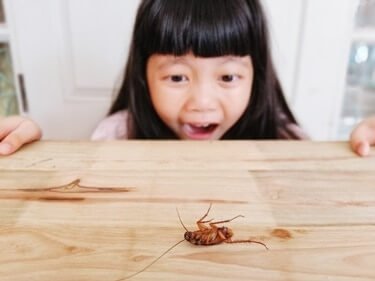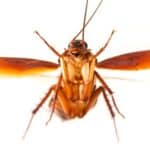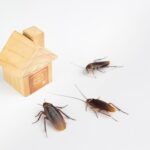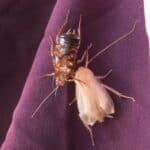The cockroach is a fast-moving, elusive insect with a reputation of being difficult to kill. They seem to always come out of nowhere, jumping out of hiding when you least expect it. So, it is no wonder some people are scared of roaches. But not everyone has a cockroach phobia. That makes it curious why some are scared of cockroaches, and others aren’t.
Humans fear the movement, anatomy, and behavior of cockroaches. People learn to be afraid of roaches when young from those close to us or our community. Sometimes, a negative cockroach experience becomes a phobia over time. Certain personality traits or brain chemicals leave us more vulnerable to phobia development.
Being scared of cockroaches is common. However, there is a difference between fear and phobia. To confirm that you have a cockroach phobia (katsaridaphobia), you must be clinically diagnosed. Whether or not you are, there are ways to overcome your cockroach paranoia, including self-help, virtual reality, and therapy.
Katsaridaphobia: The Fear of Cockroaches
While most people find cockroaches unsightly, they may not fear them. Those who do may not have a phobia. According to Harvard Medical School, phobias are defined as fears that are:
- Irrational
- Unrealistic
- Debilitating
Depending on the severity, it can lead to intense anxiety and paranoia. For people with a phobia of cockroaches, they’re dealing with katsaridaphobia. “Katsarida” is the Greek word for cockroaches. Of course, recoiling away from the sight of a roach isn’t the same as being unable to function around them.
You only have katsaridaphobia if seeing a cockroach triggers intense fear, as characterized above. You may have terrifying fantasies about what might happen when you’re around a cockroach. You may react strongly and exhibit irrational behavior when you encounter one. You may also be unable to go about your daily life and handle responsibilities at the suggestion that one is near you. Even the thought of one may cause this fear.
That’s just to name a few examples, but there are many more. For people who face this issue, it’s hard to live with the phobia. That’s why those with bad cases of katsaridaphobia may decide to seek treatment.
Why Am I Paranoid About Roaches?
While cockroach phobias are the extreme version, an average fear of cockroaches isn’t uncommon. In fact, it’s not even unwarranted. Louisiana State University hypothesizes that humans are naturally frightened of:
- Unnatural movement
- Organisms that can breed in large quantities
Despite their small size, roaches can move up to speeds of 3 miles per hour. Their populations can grow exponentially large in a short span of time. It was also hypothesized that we are paranoid about the thought of them squeezing into body cavities. Roaches are known to squeeze themselves into various crevices within a home.
Fearing cockroaches can also stem from their anatomy as well. This includes their:
- Twitching antennas and limbs
- Buggy eyes
- Wings
These traits are alien to us. That can lead our natural survival instincts to kick in and warn us to stay away from these creatures. While, logically, roaches can do little to attack or hurt us, they’re dangerous in a way. Our brains may overreact by making us too wary of roaches to the point of fear.

Scared Of Flying Cockroaches
You may be afraid of flying cockroaches more than any other kind. Along with their other scary traits, we can also look to a cockroach’s wings as a reason for fear.
The sounds they make, especially the flutter of their wings, are unfamiliar to us. Additionally, humans tend to dislike the thought of insects flying towards us. Being scared of flying cockroaches may be attributed to that basic fear.
Why Am I Scared Of Cockroaches?
A fear of roaches is a well-explored topic. It connects to our fear of other insects, as well as animals and organisms in general. Experts on behavior and phobias have several viewpoints that explain why you have a certain phobia. According to the Journal of Clinical Psychology, these are:
- Behavioral
- Psychoanalytic
- Genetic
- Cultural
- Biochemical
- Cognitive
Behavioral Viewpoint
This argues that phobias develop as a result of a frightening or traumatic experience. With cockroaches, this can include events, such as:
- Seeing a cockroach on your food
- Having a cockroach fly towards you
However, such phobias can also develop from seemingly unrelated items. They only need to be associated with a traumatic event. For example, you may have opened a jar and a cockroach crawled out. As a result, the sight of jars or the thought of opening one may trigger katsaridaphobia.
Aside from that, humans have evolved to be frightened of certain objects because they are naturally threatening. That may include containers or spaces with the contents hidden inside. Our ancestors have learned to fear the unknown, as this was a potential danger to their life.
This theory also states that you can learn the behaviors more directly. How you feel towards cockroaches (or anything else in general) is unconsciously taught to you by:
- Parents
- Caregivers
- Friends
- People in your community
How they react or feel about it can be translated over to you as a child. You grow up having developed similar reactions and feelings.
Psychoanalytic Viewpoint
This viewpoint suggests that phobias originate from our early childhood experiences. Such phobias are symbolic of some hidden, unconscious feeling. Under this view, having a cockroach phobia does not really mean that you are severely scared of cockroaches. Instead, your phobia is a cover-up of possible inappropriate thoughts and feelings towards something else.
It may be that your cockroach phobia is easier to handle than such feelings. Therefore, it’s masked as a phobia. However, this viewpoint was developed in the 19th century and is severely outdated.
Genetic Viewpoint
Some research speculates that certain people have inherited genes for a cockroach phobia. That may sound far-fetched since there are no specific genes that code for katsaridaphobia. However, personality traits, such as neurosis, are transmitted genetically. Such traits leave one more susceptible to developing a certain phobia.
Cultural Viewpoint
This specific point of view is similar to the behavioral viewpoint, in that you can learn a phobia from others. The difference lies in who and where you learn your phobia from. The cultural viewpoint states that your cockroach phobia developed from observing the behavior and reactions of people in your society or community.
It doesn’t have to be the individuals that are or have been closest to you. For example, maybe your community is very outspoken about their feelings toward cockroaches. Then, perhaps, you have a higher likelihood of exhibiting such feelings yourself. This can eventually become a physical fear of cockroaches.
Biochemical Viewpoint
People also have different brain chemistry, which can be unique to an individual, much like we have different personality traits. This is the biochemical viewpoint.
Instead of containing genes for certain personality traits, certain chemicals in your brain leaving you more likely to develop a phobia. Another person, who doesn’t have this brain chemistry, won’t produce that same fear.
For instance, two people can experience the same traumatic event. One may not produce specific brain chemicals that aid in the development of phobias. Another may. In this case, only the latter person will develop a phobia from that event.
Cognitive Viewpoint
The cognitive viewpoint says that the development of a phobia is dependent on how an individual cognitively interprets a situation. Take, for example, a flying cockroach. If you see it flying towards you, you either interpret it as something dangerous or just something that gets in your way.
Interpreting the flying cockroach as dangerous elicits fear. This may increase your anxiety and eventually increase the probability of becoming scared of cockroaches, or flying cockroaches in particular.
On the other hand, you may see it as merely an object in your path. You will move out of the way and carry on with your day. If this is the case, you will probably not develop any phobia from that event.
How to Not Be Scared of Cockroaches
You should not belittle yourself for the phobia. However, you can control overcoming your fear. The following is a list of things you can do to help yourself not be scared of cockroaches:
- Self-help
- Various therapies
- Virtual reality
- Phone or tablet apps
Self-Help
To determine treatments for katsaridaphobia, you don’t necessarily have to visit a doctor’s office. Several lifestyle changes can help. These may curb anxiety symptoms or paranoia related to your fear of cockroaches:
Diet
You can avoid stimulants, such as coffee, tea, or soft drinks. This will reduce the likelihood of heart palpitations, panic attacks, or shortness of breath. These are all common symptoms related to anxiety. Eating nutritious meals and exercising regularly will also be beneficial. It keeps you stimulated, distracting you from your fear.
Self-Soothing
You can also learn about relaxation techniques. These can help you clear your head and prevent yourself from aggravating your own anxiety towards cockroaches. Such techniques include, but are not limited to:
- Yoga
- Meditation
- Breathing exercises
Even massages are considered a relaxation technique that you can use. However, this obviously requires other people and services. Even getting enough sleep will aid a cluttered mind.
Group Help
If none of these options are feasible or work for you and your lifestyle, you can look into self-help groups. These may be more helpful to you if you prefer talking things out with others.
Self-help groups can provide you with a supportive environment. Here, all the people in the group have similar experiences. You don’t have to feel like you are alone. You can get such resources from your doctor or research online.
Therapy for Phobias
Perhaps self-help methods don’t seem to work, or your cockroach phobia is so debilitating that you cannot resolve it independently. In this case, therapy is another valid option. Because a phobia is a type of anxiety disorder, therapy can be beneficial in helping you to overcome it.
There are a wide variety of therapies that can help you not be scared of cockroaches. The most prominent ones are summarized in the table below. Dr. Ananya Mandal, a Clinical Pharmacology and Therapeutics medical doctor for the National Health Service, gathered this information.
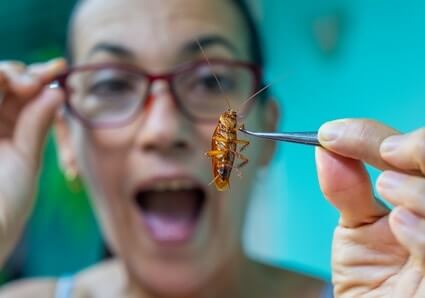
Common Therapies That Help with Phobias
| Therapy Type | Definition | Treatment Methods |
|---|---|---|
| Counseling | A talking therapy with a trained therapist. | Listening to you and helping you find ways to cope via single or multiple discussion sessions |
| Cognitive Behavioral Therapy (CBT) | A form of counseling that can unpair your anxiety response from your particular fear trigger. | Desensitization/Exposure therapy: gradually exposes you to your fear to decrease related anxiety Cognitive restructuring: helps identify counterproductive thought patterns and replacing them with realistic ones. |
| Psychotherapy | Another form of counseling that suggests ways to overcome pessimistic self-talk related to your fear trigger. | Work to diminish negative outlooks and thought processes related to your phobia, as fear begets fear. |
Virtual Reality
Technology has advanced so far that we’re now exploring virtual reality in a clinical setting. According to the Harvard Review of Psychiatry, virtual reality treatments, sometimes paired with traditional behavioral treatments, have been tested as beneficial. This is especially true for individuals that have had either flying phobias or a fear of heights.
Other studies have also demonstrated that the treatment has sustained benefits over the years. Of course, not all clinical practices have incorporated virtual reality into their toolbox. It’s still relatively new, but it is an option that is beginning to gain more attention.
This method may not be accessible to everyone. It does require expensive equipment. It’s also not as commonplace as traditional therapies. Because of this, places that offer this service may be more expensive.
Phone or Tablet Apps
Phone or tablet apps are a cheaper substitute for cognitive behavioral therapy methods or virtual reality. It only requires that you download an app, such as AR cockroach, and practice self-discipline. Such apps have been created to simulate cockroaches crawling on your floor. You then tap to get rid of them.
Do keep in mind that the design of the app is to have endless virtual cockroaches crawl around. Be warned! Using these apps can gradually expose you to cockroaches. This can enable you to overcome your cockroach phobia by exposure alone. At the least, it may mitigate phobic symptoms.
You can allocate time out of each day using the app. This might help you build up your tolerance level. You can also pair this with watching videos with cockroaches so that you can desensitize yourself to your fear trigger at home. This does not, however, replace the effectiveness of proven therapies.
The fear of cockroaches is natural, but a phobia isn’t. If you find that it’s harming your lifestyle and ability to function, then it’s worth seeking out resources and finding help. These annoying pests shouldn’t have control over your life.
